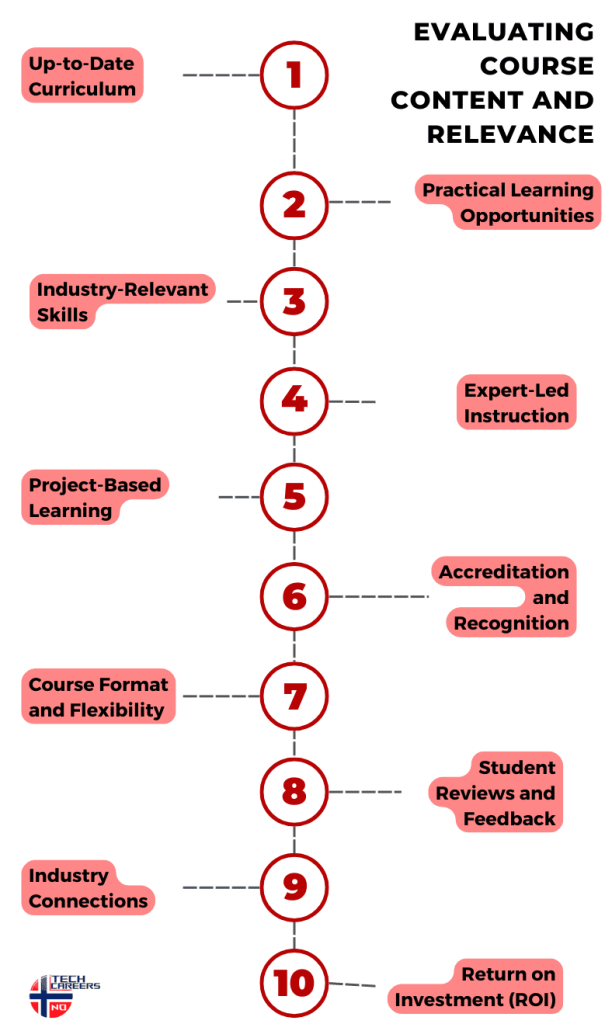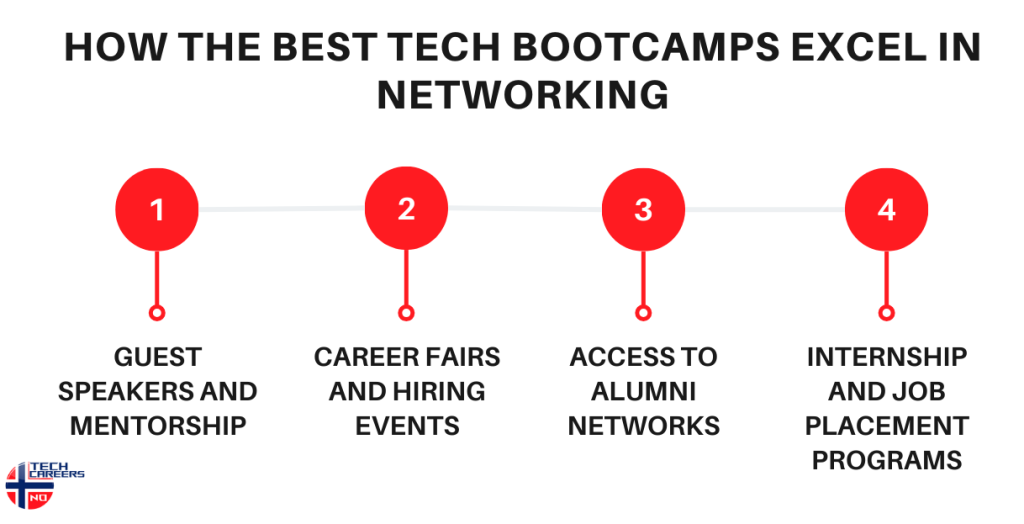
Norway is rapidly establishing itself as a thriving tech hub, driven by innovation, digital transformation, and a strong emphasis on sustainability. With technology reshaping industries across the country, the demand for skilled tech professionals is on the rise. As a result, the right tech skills have become essential for anyone looking to advance their career or pivot into a high-demand field.
Choosing the right tech courses online can be a game-changer, offering the flexibility to learn at your own pace while acquiring the skills that employers in Norway are actively seeking. Whether you’re interested in data analytics, software development, or cybersecurity, online courses provide an accessible path to gaining expertise without the constraints of traditional education. This approach not only saves time but also opens doors to lucrative job opportunities in Norway’s evolving tech landscape.
Understanding Your Career Goals
Before diving into the sea of tech courses online, it’s crucial to have a clear understanding of your career objectives. Knowing where you want to go in your tech journey can help you choose the right learning path and maximize the benefits of your education.
Define Your Short-Term and Long-Term Career Objectives
Start by defining your short-term and long-term career goals. Short-term objectives might include learning a new programming language, gaining foundational knowledge in a tech field, or earning a certification that boosts your resume. Long-term goals, on the other hand, could involve landing a high-paying IT job Norway, becoming a specialist in a niche area like artificial intelligence, or even working towards a managerial role in tech. By setting these objectives, you create a roadmap that guides your course selection, ensuring that each learning step brings you closer to your ultimate career vision.
Types of Tech Careers Popular in Norway
Norway’s tech industry offers a diverse range of career opportunities, with several fields experiencing significant growth. Here are some of the most popular tech careers in Norway:
- Data Science and Analytics: As companies in Norway increasingly rely on data-driven decisions, there is a rising demand for data scientists who can interpret complex data sets to guide business strategies.
- Web Development: Building user-friendly and responsive websites is essential for businesses looking to expand their online presence. Web developers skilled in both front-end and back-end technologies are highly sought after.
- Cybersecurity: With the growing threat of cyber-attacks, cybersecurity professionals play a crucial role in protecting sensitive information. This field is particularly appealing for those interested in safeguarding digital assets.
- Cloud Computing and DevOps: As Norwegian companies continue to migrate to cloud services, skills in platforms like AWS, Azure, and Google Cloud are in high demand, particularly for roles that involve managing and automating cloud-based infrastructure.
Understanding these popular tech paths can help you tailor your learning experience to match the job market’s needs. Additionally, if your goal is to secure a role that supports a work visa in Norway, pursuing skills in these high-demand areas can increase your chances of meeting visa eligibility requirements and securing employment.
Aligning Your Career Goals with Specific Courses
Aligning your career goals with the right tech courses online is an efficient way to save time, resources, and effort. For instance, if your short-term goal is to land a junior developer position, a course focused on programming languages like Python or JavaScript would be more relevant than a generalized tech overview. Conversely, if your long-term aim is to specialize in cybersecurity, enrolling in courses that offer advanced certifications will be more beneficial than introductory classes.
By choosing courses that directly contribute to your career objectives, you avoid unnecessary detours and ensure that every learning investment brings you closer to achieving your professional aspirations. This targeted approach not only enhances your qualifications but also prepares you for the evolving tech job landscape in Norway, paving the way for a successful career in the field.
Evaluating Course Content and Relevance
Selecting the right IT courses in Norway involves careful evaluation of course content to ensure it aligns with industry needs and your career goals. Here’s a checklist of key elements to consider:
- Up-to-Date Curriculum:
- Ensure the course covers current technologies, trends, and skills relevant to the tech industry.
- Look for updated content in areas such as AI, cloud computing, cybersecurity, and programming languages.
- Practical Learning Opportunities:
- Check if the course includes hands-on projects, coding labs, or real-world applications.
- Look for courses that offer practical challenges like coding exercises, data analysis tasks, or software development projects.
- Industry-Relevant Skills:
- Verify that the course teaches skills that are in demand among Norwegian employers, such as Python, JavaScript, or data analytics.
- Focus on courses that cover emerging technologies relevant to current job openings.

- Expert-Led Instruction:
- Evaluate the qualifications of the instructors, prioritizing those with real-world industry experience.
- Courses developed in collaboration with tech professionals or companies are often more aligned with job market needs.
- Project-Based Learning:
- Opt for courses that incorporate project-based assessments, allowing you to build a portfolio.
- Projects should mirror real-world scenarios to help you apply theoretical knowledge effectively.
- Accreditation and Recognition:
- Check for courses that are accredited or recognized by relevant Norwegian or international bodies, such as NOKUT or ISO standards.
- Accredited courses add credibility to your qualifications and are often valued by employers.
- Course Format and Flexibility:
- Consider the course format: self-paced, live sessions, or hybrid. Choose what fits your learning style and schedule.
- Flexible courses allow you to balance learning with work or other commitments.
- Student Reviews and Feedback:
- Read reviews from past students to gauge the course’s effectiveness and relevance.
- Look for feedback on how well the course prepares students for the Norwegian job market.
- Industry Connections:
- Check if the course offers networking opportunities, such as access to tech meetups, webinars, or job placement services.
- Courses with strong industry connections can provide valuable career support and networking.
- Return on Investment (ROI):
- Evaluate the cost of the course against the potential career benefits and earning prospects.
- Consider whether the skills gained justify the investment in terms of time, money, and effort.
This checklist will help ensure that the IT courses in Norway you choose are not just educational but strategically aligned with your career aspirations, setting you up for success in a competitive job market.
Accreditation and Recognition of the Course
When choosing IT courses in Norway, accreditation and recognition are essential to ensure that your education meets quality standards and enhances your employability. Here’s a detailed breakdown of why accreditation matters and what to look for:
Why Accreditation Matters
Accreditation is a quality assurance measure that ensures the course meets established educational standards. Here’s why it’s crucial:
- Ensures Quality and Relevance: Accredited courses meet rigorous standards, ensuring up-to-date content and industry relevance.
- Boosts Employability: Employers prefer candidates with accredited certifications, as they validate your skills and knowledge.
- Supports Work Visa Applications: Accredited courses and certifications can meet the educational requirements for a work visa in Norway, making you a more attractive candidate.
Key Accreditation Bodies to Look For
When evaluating a course, consider recognition from these well-known Norwegian and international accrediting bodies:
- NOKUT (Norwegian Agency for Quality Assurance in Education): Norway’s main accrediting body, ensuring courses meet national educational standards.
- ISO (International Organization for Standardization): Internationally recognized, ensuring global standards of education quality.
- EdX and Coursera Certifications: Platforms that offer accredited courses in partnership with top universities and organizations worldwide.
- Tech-Specific Certifications: Bodies like CompTIA, Microsoft, and Cisco provide globally recognized certifications that are highly valued in IT roles.
Benefits of Accredited Certifications for Job Prospects
Accredited courses offer several advantages that can directly impact your career:
- Increased Credibility: Certifications from accredited courses are trusted by employers and often required for specific IT roles.
- Access to Job Boards and Networks: Accredited courses often provide access to exclusive job portals and professional networks.
- Pathway to Advanced Certifications: Some courses act as stepping stones to more advanced certifications, which can further boost your qualifications.
How to Verify Course Accreditation
To ensure the course is genuinely accredited, follow these steps:
- Check Official Websites: Visit the accrediting body’s official website to verify the course or institution’s accreditation status.
- Review Course Partnerships: Look for courses that mention collaborations with recognized tech companies or industry bodies.
- Read Student Reviews: Feedback from former students can offer insights into the value and recognition of the course.
Choosing an accredited IT course in Norway ensures that your education is not only comprehensive but also respected by employers, setting you on a solid path toward achieving your career goals.
Industry Connections and Networking Opportunities
When selecting an IT course, it’s important to consider how the program connects you with the tech industry. The best courses don’t just teach you skills; they also provide valuable opportunities to network with professionals, gain insider knowledge, and even secure job placements. Building industry connections can be a game-changer, especially in Norway’s competitive job market, and it’s often what sets the best tech bootcamps apart from standard online courses.
The Importance of Industry Connections
Industry connections give you a direct line to potential employers, mentors, and collaborators. Courses that offer these connections often include guest lectures from industry experts, access to tech meetups, and partnerships with leading companies. These opportunities allow you to gain insights into the latest industry trends, understand real-world applications of your skills, and make valuable contacts that can lead to job offers or internships.
For those pursuing IT careers in Norway, being part of a course with strong industry ties can help bridge the gap between learning and employment. Courses that partner with tech companies can provide access to exclusive job openings, helping you get your foot in the door of Norway’s top tech firms.
How the Best Tech Bootcamps Excel in Networking
The best tech bootcamps are renowned for their emphasis on networking and real-world connections. Unlike traditional courses, bootcamps are often designed to mirror the fast-paced environment of the tech industry, providing immersive, project-based learning alongside direct engagement with industry professionals. Here’s what sets them apart:
- Guest Speakers and Mentorship: Bootcamps frequently invite tech professionals to share insights, conduct Q&A sessions, and mentor students. This real-world guidance can be invaluable as you learn to navigate the industry landscape.
- Career Fairs and Hiring Events: Many bootcamps organize career fairs and exclusive hiring events where students can meet potential employers directly. This is a great opportunity to showcase your skills, make a strong impression, and even land a job offer on the spot.
- Access to Alumni Networks: Graduates from the best tech bootcamps often become part of a vibrant alumni community. These networks can provide ongoing support, job referrals, and insider knowledge about different companies and roles within the tech industry.
- Internship and Job Placement Programs: Top bootcamps often have dedicated career services teams that assist students with resume building, interview preparation, and direct job placement opportunities. These services are especially beneficial for international students aiming to secure a work visa in Norway.

Leveraging Networking Opportunities in Tech Courses
To make the most of the networking opportunities provided by your chosen tech course, consider the following tips:
- Engage Actively: Attend all networking events, participate in Q&A sessions, and connect with guest speakers on professional platforms like LinkedIn.
- Build Your Portfolio: Use the practical projects and assignments from your course to build a strong portfolio that you can showcase during networking events and interviews.
- Join Local Tech Meetups: Outside of your course, engage with Norway’s tech community by joining local meetups, hackathons, and online forums. These gatherings provide additional opportunities to meet like-minded individuals and industry leaders.
- Stay Connected: Follow up with the contacts you make during your course. A simple message expressing gratitude or a request for advice can keep the connection alive and open doors in the future.
Industry connections and networking are more than just add-ons; they’re integral to building a successful tech career. By choosing courses, especially the best tech bootcamps, that emphasize real-world engagement, you not only learn the skills you need but also gain the relationships that will support your career growth in Norway’s vibrant tech ecosystem.
Best Tech Courses for Beginners
Getting started in the tech world can feel overwhelming, especially with the vast number of courses available. However, finding the right entry-level course can set you on the path to success, equipping you with the foundational skills needed to break into the tech industry. Whether you’re a complete novice or looking to switch careers, choosing beginner-friendly courses is essential for building confidence and competence in your chosen field. Here are some of the best options for beginners, including popular tech bootcamps and other accessible learning paths.
1. Tech Bootcamps: Intensive and Fast-Paced Learning
Tech bootcamps have gained immense popularity in recent years for their hands-on, immersive approach to learning. These intensive programs are designed to equip beginners with job-ready skills in a short period, typically ranging from a few weeks to a few months. Bootcamps often focus on specific areas like web development, data science, or UX/UI design, allowing you to dive deep into your chosen field without the lengthy commitment of a traditional degree.
- Coding Bootcamps: Programs like Le Wagon and Codeworks offer beginner-friendly coding bootcamps that teach the basics of programming languages such as Python, JavaScript, and Ruby. These bootcamps are ideal for those looking to quickly gain the skills needed for entry-level development roles.
- Data Science Bootcamps: For those interested in data analytics or machine learning, bootcamps like General Assembly and DataCamp provide a comprehensive introduction to data manipulation, statistical analysis, and predictive modeling.
- Cybersecurity Bootcamps: With the rising need for digital security, bootcamps like Ironhack offer courses that cover the fundamentals of cybersecurity, preparing beginners for roles such as security analysts or penetration testers.
Tech bootcamps are perfect for individuals who want a fast track into the tech industry, providing not only technical skills but also networking opportunities and career support.
2. Online Courses from Renowned Platforms
Platforms like Coursera, Udemy, and LinkedIn Learning offer a wide range of beginner-level courses tailored to various tech fields. These courses are typically self-paced, allowing you to learn at your convenience. They are an excellent starting point for those who prefer a less intense approach compared to bootcamps.
- Introduction to Computer Science by Harvard (CS50): Available on edX, this free course offers a gentle introduction to computer science, programming, and problem-solving, making it one of the most popular courses for beginners worldwide.
- Web Development for Beginners on Udemy: Courses like “The Complete Web Developer Bootcamp” cover the basics of HTML, CSS, and JavaScript, providing a solid foundation for those looking to start a career in web development.
- Python for Everybody by the University of Michigan: Available on Coursera, this course is perfect for absolute beginners wanting to learn Python, one of the most versatile and beginner-friendly programming languages.
3. University-Backed Online Certifications
Many universities now offer online certifications specifically designed for beginners. These programs often provide a mix of theoretical knowledge and practical applications, bridging the gap between academic learning and industry requirements.
- Google IT Support Professional Certificate: This beginner-friendly course covers foundational IT skills, including troubleshooting, networking, and system administration. It’s a great starting point for those looking to enter the IT field without prior experience.
- Introduction to Cyber Security Specialization by NYU: Offered on Coursera, this course provides a solid grounding in cybersecurity principles, network security, and basic cryptography, making it ideal for those new to the field.
4. Free Coding Resources and Workshops
For those who prefer to test the waters before committing to a paid course, free resources like Codecademy and freeCodeCamp offer beginner-level tutorials that cover basic coding concepts. These platforms are great for gaining initial exposure to coding and understanding if tech is the right path for you.
Choosing the right beginner tech course depends on your learning style, career goals, and the time you can commit. Whether you opt for a tech bootcamp for a rapid entry into the field or a more relaxed, self-paced online course, these programs provide the essential skills and knowledge to start your tech journey with confidence.
Start Your Tech Journey Today!
Choose the right online course that aligns with your career goals, equips you with in-demand skills, and sets you on the path to success in Norway’s thriving tech industry.

